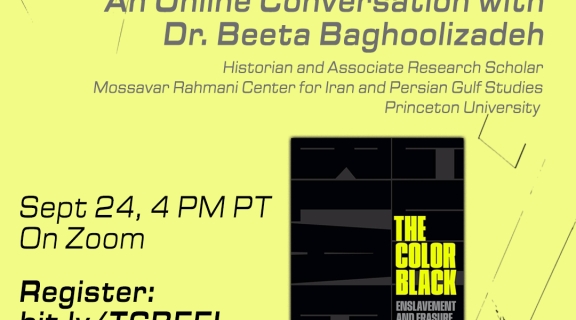
A Conversation with Dr. Beeta Baghoolizadeh on The Color Black: Enslavement and Erasure in Iran
Overview
Join us September 24th, 4 PM (PT) for an online conversation with Dr. Beeta Baghoolizadeh about her new book, The Color Black: Enslavement and Erasure in Iran (Duke University Press, 2024).
This free event is co-sponsored by the Department of History at SF State. You must register here.
You can purchase the book here at a 30% discount using this code: E24BGHLZ. You can also register for the event in advance here.
Dr. Baghoolizadeh is a historian and Associate Research Scholar at the Mossavar-Rahmani Center for Iran and Persian Gulf Studies, Princeton University. Her first book examines questions concerning race, gender, historiography, and visuality through the lens of enslavement and abolition in the nineteenth and twentieth centuries.
The Color Black traces the domestic and royal enslavement of East Africans during the nineteenth century and the aftermath of abolition in Iran. Although enslavement was only formally abolished in Iran in 1929, Iranians popularly deny any history of slavery while still hanging onto racist anti-Black vestiges in their every day culture. Her work not only argues that Iranians had a dynamic understanding of race and racialization during the last period of legal enslavement, but also explains why the erasures surrounding these issues remain so pervasive. The Color Black has won the "Scholars of Color First Book Award" at Duke University Press.
Baghoolizadeh’s work has been published or is forthcoming in the American Historical Review (AHR), Comparative Studies of South Asia, Africa, and the Middle East (CSSAAME), and Lateral: Journal of the Cultural Studies Association. Prior to joining Princeton, Beeta was an Assistant Professor of History and Critical Black Studies at Bucknell University. Her research has been supported by the Social Science Research Council (SSRC), and she has also been a Research Fellow at the Bard Graduate Center and a Regional Faculty Fellow at the University of Pennsylvania’s Wolf Humanities Center.